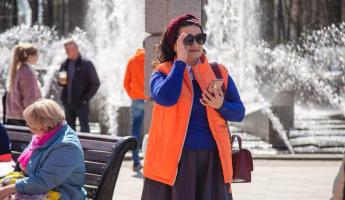В очередной порции секретных материалов переписки госдепартамента США, публикуемых сайтом WikiLeaks, представлен подробный отчет о встрече президента Грузии Михаила Саакашвили с заместителем министра обороны США по вопросам международной безопасности Александром Вершбоу, которая состоялась 19 октября 2009 года. Согласно документу, в ходе встречи грузинский лидер выразил надежду на то, что США "найдут стимулы для Беларуси, которые позволят воспрепятствовать официальному признанию ею Абхазии и Южной Осетии".
В беседе с представителем США Михаил Саакашвили выразил особую озабоченность по поводу возможного признания Беларусью независимости Абхазии и Южной Осетии. По словам грузинского лидера, позиции президента Беларуси Александра Лукашенко и российского премьера Владимира Путина по данному вопросу существенно расходятся. В связи с этим Михаил Саакашвили предложил США «предложить морковку» Беларуси с целью воспрепятствовать возможному признанию Абхазии и Южной Осетии.
Михаил Саакашвили заявил, что основной мотивацией для Александра Лукашенко являются деньги, а российское руководство предлагает Беларуси компенсацию за решение данного вопроса. Между тем президент Грузии предположил, что любое предложение со стороны Запада и, в особенности предложение программы военного обучения и образования (IMET) со стороны США, сможет повлиять на решение белорусского руководства.
По словам грузинского лидера, официальный Минск внимательно следит за действиями США, и последний визит вице-президента Байдена в Восточную Европу стал причиной задержки с решением о признании Абхазии и Южной Осетии. Михаил Саакашвили также проинформировал американских чиновников о том, что Беларусь обратилась с просьбой принять в Тбилиси белорусских экспертов для изучения действий России в ходе военного конфликта 2008 года и анализа спорных аспектов этих событий. Грузия согласилась принять экспертов.
Саакашвили: Лукашенко нужен кто-то, кто покажет ему дорогу к реформам
Кроме того, из депеши госдепартамента, опубликованной изданием «Русский репортер», следует, что Михаил Саакашвили убежден, что Беларусь находится в поисках альтернативы Кремлю, а Александр Лукашенко нуждается в ком-то, кто «покажет ему дорогу» к реформам. Тем не менее, Александр Вершбоу в ходе встречи выразил сомнение в заинтересованности белорусского лидера в проведении реформ.
Кроме того, согласно опубликованному документу, заместителя министра обороны по вопросам международной безопасности США убеждали грузинского лидера не прекращать реформы, направленные в перспективе на вступление Грузии в НАТО. В свою очередь грузинский президент заявил, что Грузия не готова реализовать потенциальные возможности США, но нуждается в углубленном содействии в сферах обороны и безопасности.
Михаил Саакашвили также выразил мнение, что Россия не будет играть положительную роль в деле открытия границ на Южном Кавказе, так как это не в ее интересах, и будет препятствовать развитию отношений между Турцией и Арменией и разрешению конфликта в Нагорном Карабахе. По словам грузинского лидера, Россия является противником каких-либо компромиссов и предпочитает, чтобы на Южном Кавказе сохранялись противоречия, а границы были бы закрыты. Михаил Саакашвили выразил мнение, что Россия ждет, пока США отойдут в сторону, чтобы продолжить «жонглировать региональными проблемами», существенными для США — Ираном, Турцией и Грузией.
Вершбоу: США не испытывает иллюзий по поводу истинных намерений России
В свою очередь Александр Вершбоу отметил, что США не испытывают иллюзий по поводу истинных намерений России, и поэтому намерены разрабатывать совместные долгосрочные планы и стратегии. В беседе с грузинским лидером Александр Вершбоу заявил, что США намерены продолжать поддерживать территориальную целостность Грузии и препятствовать процессу признания Абхазии и Южной Осетии со стороны других стран.
Кроме того, в ходе переговоров Михаил Саакашвили неоднократно подчеркивал, что после вторжения в Грузию в 2008 году он ожидал, что Россия вторгнется в Крым. По его мнению, Россия намерена нагнетать напряженность на полуострове, чтобы затем предложить украинскому руководству свою помощь в решении проблемы. Михаил Саакашвили заявил, что Россия намерена и дальше оказывать давление на Грузию и Украину, «чтобы преподать урок прочим странам на постсоветском пространстве».
Оригинал:
C O N F I D E N T I A L SECTION 01 OF 03 TBILISI 001965 SIPDIS E.O. 12958: DECL: 10/26/2019 TAGS: MARR, MASS, PREL, RS, UP, BO, GG SUBJECT: GEORGIA: MISHA TELLS ASD VERSHBOW GEORGIA IS COMMITTED TO PEACEFUL INTEGRATION AND A LONG-TERM DEFENSE REFORM PROCESS Classified By: Ambassador John R. Bass for reasons. 1.4 (b) and (d).
1. (C) SUMMARY. President Saakashvili assured visiting Assistant Secretary of Defense for International Security Affairs Alexander Vershbow that Georgia understands there will be no military solution to the conflicts — only Georgia’s further progress on democratic and economic reform could re-attract the separatist regions of Abkhazia and South Ossetia in the long term. Vershbow urged Georgia to remain committed to the reform process which will lead Georgia eventually to NATO membership. Saakashvili predicted that Russia was unlikely to play a helpful role in opening borders in the South Caucasus and would work to prevent the development of relations between Turkey and Armenia and the resolution of the conflict in Nagorno-Karabakh. Saakashvili recognized that Georgia was not ready for U.S. capabilities, but required deepened defense and security assistance. Saakashvili assured Vershbow that Georgia would not stand in the way of MAP accession for Montenegro and asserted that Russia intends to keep pressure on
Ukraine to fall in line with the Kremlin. Saakashvili hoped the United States would find incentives for Belarus not to recognize the independence of Abkhazia and South Ossetia. End Summary.
SECURITY CONCERNS AND U.S. ASSISTANCE
2. (C) ASD Vershbow told Saakashvili during a meeting on October 19 that the establishment of the Security Working Group showcased the importance the U.S. places on Georgia’s security. The goal of the U.S. was to prevent a repeat of last year’s conflict between Georgia and Russia. There was a need to create space for Georgia’s political, economic and security sector reforms. The U.S. will continue to support Georgia’s defense reform and professionalization in a step-by-step approach. The U.S. stands by the principle that Georgia has a legitimate right of self-defense and the U.S. will not recognize any arms embargo of Georgia. At the same time, Georgia was under a microscope — not only in Moscow, but in the West — and it was in our common interest to proceed carefully. ASD Vershbow emphasized the U.S. understands that Georgia’s security is a critical component to progress on democratic reform. The U.S. expects Moscow to criticize any cooperation with Georgia on the security front and the U.S. is prep ared t
o deal with that criticism. For this reason, it is imperative that the U.S. and Georgia coordinate messaging, as there is a need to avoid Russia exploiting U.S.-Georgia cooperation.
3. (C) Saakashvili thanked ASD Vershbow for strong signs of U.S. support, as security cooperation is crucial for Georgia’s survival. U.S. visits and signs of support, such as exercises and ship visits have second-order effect, as the business community is calmed by U.S. presence. Investment grows when there is perception that Georgia is not isolated. Saakashvili assured ASD Vershbow that Georgia will not give Russia a pretext for an attack. That said, Saakashvili stressed that time matters, as Georgia needed a deterrent. If Russia believed it will be easy to attack Georgia, the possibility of such an attack will increase. Saakashvili told ASD Vershbow that he personally had disagreed with former Secretary of State Rice’s position opposing MANPADS sales to Georgia in 2008 (Saakashvili stated Poland ignored Qsales to Georgia in 2008 (Saakashvili stated Poland ignored U.S. opposition to the sale). ASD Vershbow reminded Saakashvili that even with added capabilities, Georgia needed to be realistic as it could neve
r defeat Russia. ASD Vershbow asked Saakashvili to r econfirm Georgia’s position that there is no military solution to the conflicts — Saakashvili readily agreed but asserted that that every minute of dela of Russia’s invasion mattered because only international intervention had prevented Russian tanks from rolling into Tbilisi.
4. (C) Saakashvili admitted that Georgia was not ready for U.S. capabilities, noting «we are not ready, we know this.» He stressed, however, that the process of defense capabilities needed to start somewhere and Georgia had a right to understand the timelines involved. Georgia agreed on the need for a multi-year long-term defense reform process. Saakashvili highlighted that Georgia’s partners calibrated their own defense assistance on U.S. action, or lack thereof. ASD Vershbow reiterated the need for a phased approach to defense reform, which will require Georgia to move in a step-by-step manner that ameliorates concerns. Deepened assistance will be enhanced by a process of education, training and improved professional management. TBILISI 00001965 002 OF 003 ASD Vershbow emphasized that support for defense reform and modernization is a long-term process and a long-term commitment by the U.S.
5. (C) Saakashvili told the ASD that he viewed Russia’s invasion in 2008 as a direct result of the West’s recognition of Kosovo and his own government’s pursuit of NATO membership. Russia’s fundamental intent was to reconstitute the former Soviet Union. Vershbow told him that the U.S. has no illusions about Putin’s intentions — therefore, it was critical that we work closely together to develop long-term plans and strategies. Deputy FM Giga Bokeria said that the Georgian government was in the process of developing a strategy for the separatist regions that would emphasize positive investments for bringing people together in the future. When asked directly if the Georgian side would be flexible about travel arrangements for Abkhazians to permit them to study in the West rather than Russia, Bokeria acknowledged the need to engage the people of the separatist regions and Georgia was working on a policy.
NATO ASPIRATIONS
6. (C) Saakashvili told ASD Vershbow that MAP accession for Montenegro would not be a problem for Georgia but it would have disastrous effects in Ukraine. Deputy Prime Minister Giorgi Baramidze urged the Alliance to craft a statement carefully in order to emphasize each country’s unique path to membership.
REGIONAL DEVELOPMENTS IN THE SOUTH CAUCASUS
7. (C) Saakashvili asserted that the opening of borders in the South Caucasus — specifically between Armenia and Turkey and any future progress on Nagorno-Karabakh — was counter to Russia’s interests. Russia did not want to be part of any solution and preferred to keep the South Caucasus dissonant and the region’s borders closed. Saakashvili said he believes Russia is counting on the U.S. to back away while Russia juggles the regional issues that matter most to the U.S.: Iran, Turkey and Georgia. Bokeria noted the appointment of former Russian Ambassador to Georgia Vyacheslav Kovalenko to be Russia’s new Ambassador to Armenia, recalling his reputation as a «disciplinarian» from Moscow would not go unrecognized in Yerevan.
CONCERN ABOUT POTENTIAL «CASCADE» OF RECOGNITIONS
8. (C) Saakashvili expressed specific concerns about whether Belarus would recognize the independence of Abkhazia and South Ossetia. Saakashvili stressed that Lukashenko and Putin disagree significantly and urged the U.S. to offer carrots to Belarus to prevent recognition. He argued that Lukashenko was motivated primarily by money — and that the Russian government was promising a payoff. Saakashvili suggested that any offer from the West — and, in particular IMET from the U.S. — could impact decision-making in Minsk. Belarus was sensitive to U.S. moves, as the recent Vice President Biden visit to Eastern Europe had delayed recognition. Belarus wants an alternative to the Kremlin and Lukashenko needs someone to «show him the way» to reform. ASD Vershbow questioned Lukashenko’s interest in reform, with Deputy FM Giga Bokeria interjecting that Lukashenko understands there would be no long-term gain for Belarus if Russia strengthened its control. Saakashvili noted that Belarus has asked to send experts to Tbil
isi to review Russian actions during the 2008 war in order to analyze QRussian actions during the 2008 war in order to analyze Russia’s action and draw necessary lessons learned. Georgia had agreed to the request.
9. (C) On the question of recognitions by other countries, mostly in Central and Latin America, ASD Vershbow assured President Saakashvili that the United States would continue to support the territorial integrity of Georgia and discourage recognition. ASD Vershbow urged the Georgians to understand that in many of the countries considering recognition, the United States had limited ability to influence their policies.
10. (C) ASD Vershbow urged the Georgian president to think creatively about venues for discussions on security issues. CFE discussions and talks on Medvedev’s proposals on European Security could be turned into areas of discussion that benefitted Western interests.
TBILISI 00001965 003 OF 003 UKRAINE — NEXT ON PUTIN’S TO DO LIST?
11. (C) Saakashvili stressed repeatedly that he expected Russia to follow its 2008 invasion of Georgia with intervention in Crimea. He predicted that Russia would incite tension in the peninsula and then make a generous offer to Yanukovych (presumed as the next president) to help solve the problem. Saakashvili said that Putin wants to keep the pressure on Ukraine and Georgia as a lesson and a warning to others in the former Soviet Union.
12. (U) This message was cleared by Assistant Secretary of Defense Vershbow. BASS
















